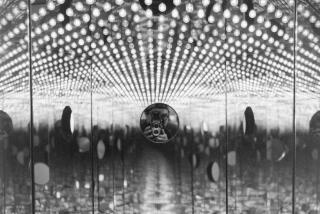Tribute to Gerry Mulligan Proves Affectionate, Evocative
- Share via
Gerry Mulligan would have been 74 on Friday. He was 68 when he died, early in 1996, not exactly an advanced age in an era when artists, even in the jazz world, are often productive into their 80s.
Given Mulligan’s many accomplishments, it’s not precisely accurate to say that the tribute concert in his honor on Sunday afternoon at the Daniel Recital Hall in Long Beach was a celebration of a brief life in jazz. But it surely was an acknowledgment of a life that, despite its significant achievements, ended while it was still filled with unexpressed creativity.
The program saluted the Mulligan legacy via two sets--one dedicated to his large ensemble writing, a second to his smaller group work--with the quality of the music, even within his later works, a testimony to his undiminished musical vision.
The larger pieces were performed by the Cal State Long Beach Studio One Jazz Ensemble, conducted by Dr. Neal Finn. Although the group is a student organization, the playing was generally well crafted--more so in the collective passages than the solo segments--providing an overview of Mulligan works ranging from his early Gene Krupa charts (the boppish “Disc Jockey Jump”) and his own late ‘50s big-band arrangements (“Mullenium”) to his writing for Stan Kenton (“Youngblood”) and his Concert Jazz Band (“Bweebida Bwobbida”).
The second half of the bill was given over to a “Gerry Mulligan All-Star Tribute Band”--actually the rhythm section employed by Mulligan in the ‘90s with the added presence of baritone saxophonist Bill Perkins. Pieces such as “Line for Lyons,” “Rocker,” “Bark for Barksdale” and “Five Brothers” benefited from the presence of Perkins’ dark-timbred baritone sound, so similar to Mulligan’s, despite an obvious lack of rehearsal time.
But it took a rendering by the rhythm trio--pianist Ted Rosenthal, bassist Dean Johnson and drummer Ron Vincent--of Mulligan’s moody but lyrical “Curtains” to get to the heart of the matter. Musically precise but ineffably swinging, soloing individually with imagination and skill, producing the familiar, understated Mulliganesque drive (especially energized by Vincent’s superb brush work), their playing was the program’s clearest link--and the most appropriate tribute--to the multiplicity of elements that made up the Mulligan musical persona.
More to Read
The biggest entertainment stories
Get our big stories about Hollywood, film, television, music, arts, culture and more right in your inbox as soon as they publish.
You may occasionally receive promotional content from the Los Angeles Times.









